Combined Operations*, a Rare Text by Londoner Clayton Marks
Several Photographs Within are One-of-a-Kind as Well
Clayton Marks is back row (left). He did the writing and his wife Jewel did
the typing. Combined Operations* was first printed/distributed in 1994.
The photo, taken in a photo studio in Glasgow, is found on page 89
[*This significant WWII history book - related to the 950 - 1,000 Canadians who volunteered for Combined Operations Command, a British organization - was reprinted in 2016 and is available via this site. See "books for sale re Combined Operations" under 'click on HEADINGS' in right-side margin.]
Introduction:
The 950 - 1,000 members of RCNVR who joined Combined Operations beginning in December, 1941, trained how to man and operate various types of landing craft soon after reaching the U.K., including Landing Craft, Assault (ALCs), Landing Craft, Mechanised (LCMs), Landing Craft (for) Infantry, Large (LCI(L)s) and more.
Inveraray was the first Combined Operations Training base from which assault landing techniques were evolved and nearly every raid that was made on the enemy coast line, such as The Lofoten Islands, Vaagso, Bruneval, St. Nazaire, Dieppe, The North African Landings, Sicily, Salerno, etc., owed something in its composition, either men, materials, or planning, to Inveraray.
Often in the early raids, Inveraray acted as an assembly point for landing craft and assault ships before their despatch on operations.
Over a quarter of a million troops of many nationalities passed through this town, forces from the United States of America, Canada, The Free French, The Netherlands, Norway, to mention a few...
Having read my father's navy memoirs front to back several times I knew he landed American troops at Arzeu on November 8, 1942. I was tempted to bend the book so I could see more of the sailor's face (centre, left of seam) but it wasn't my book. And I knew in my bones it was Dad, and I have since found other photos taken by Lt. F. A. Hudson on that same day. I can spot my father in two more of Hudson's collection. (Yes, later I did buy the book too!)
Introduction:
The 950 - 1,000 members of RCNVR who joined Combined Operations beginning in December, 1941, trained how to man and operate various types of landing craft soon after reaching the U.K., including Landing Craft, Assault (ALCs), Landing Craft, Mechanised (LCMs), Landing Craft (for) Infantry, Large (LCI(L)s) and more.
During the first two years of their service they participated in the Dieppe Raid (Operations Rutter and Jubilee on July 7 and Aug. 19, 1942 respectively), the invasion of North Africa (Operation Torch, beginning Nov. 8, 1942), the invasion of Sicily (Operation Husky, beginning July 10, 1943), and the invasion of Italy (Operations Baytown and Avalanche, beginning Sept. 3 and 9, 1943, respectively).
They suffered the first losses to their landing craft crews at Dieppe but persevered throughout the war and earned high praise - e.g., from General B. Montgomery for their outstanding efforts in Sicily - for transporting troops and all the material of war to (at times) heavily defended shores amidst "chaos and carnage."
They suffered the first losses to their landing craft crews at Dieppe but persevered throughout the war and earned high praise - e.g., from General B. Montgomery for their outstanding efforts in Sicily - for transporting troops and all the material of war to (at times) heavily defended shores amidst "chaos and carnage."
Clayton Marks documents a good part of the Canadian story and inspired fellow shipmates to record more stories after his book was sold and distributed, e.g., at navy reunions. Links to two other volumes of Navy veterans' stories, entitled St. Nazaire to Singapore: The Canadian Amphibious War, are provided on this website - e.g., Volume One; as well, Volume Two. (Links/addresses change on occasion; email gordh7700@gmail.com for assistance, if required).
Mr. marks also attempted to include photographs from his own collection and from other sailors using copying equipment from the 1990s. Some are quite good and others are in rough shape. I share his photos here (and some alternative options found online or in other books) with a bit of information related to the actions and events re Combined Operations.
ACKNOWLEDGEMENTS
The author wishes to acknowledge the many shipmates who contributed pictures, stories, sagas and many memories of our experiences in the Royal Canadian Navy (Combined Operations).
A special thanks to David Lewis, Roy Burt and Donald Kemsley for their assistance, and for pictures from their private collections. A special debt of gratitude is owed to Bill Grycan, Al Kirby, F.J. McParlan, Ted Zeally, Mac Rattan, Bill Prout, Everett Smith, Major C.H. Murphy and Robert McRae, to mention only a few of the many shipmates who so freely recalled the events and experiences that altered their lives. Also, to the memory of Tom Pickles, Bill Roberts, Lt. Dana Ramsay and Lt. Cdr. Jack Koyl for their part in our history...
The first illustration reveals the operations (and their start dates) that - for the most part - involved many Canadians in Combined Operations, beginning with St. Nazaire (western coast of France), March 8, '42. No credit is given to the illustrator/source but I include another copy from a known source.
COMBINED OPERATIONS MUSEUM AT INVERARAY
The Museum, the only one of its kind in the United Kingdom, was opened by Lord Lovat, the famous and much decorated Commando Leader, on May 25, 1984, in the presence of the Chiefs of Services in Scotland. It is located in Cherry Park, a few moments walk from the Castle, being established and managed by the Argyll Estates Trustees.
The front cover -
Combined Ops insignia, three military forces represented
The book's Introduction (Page 1) begins with the following:
This record contains some of the accounts and experiences of Royal Canadian Naval Personnel who served in Combined Operations during World War II. The growth of Combined Operations was considerable, from a small unit in 1941 to the utmost by D-Day (Normandy), 1944.
Here are stories and data from the Officers and Ratings who served in this Organization. Whether these operations failed or succeeded has not been taken into account, but are presented here as they happened.
The author wishes to acknowledge the many shipmates who contributed pictures, stories, sagas and many memories of our experiences in the Royal Canadian Navy (Combined Operations).
A special thanks to David Lewis, Roy Burt and Donald Kemsley for their assistance, and for pictures from their private collections. A special debt of gratitude is owed to Bill Grycan, Al Kirby, F.J. McParlan, Ted Zeally, Mac Rattan, Bill Prout, Everett Smith, Major C.H. Murphy and Robert McRae, to mention only a few of the many shipmates who so freely recalled the events and experiences that altered their lives. Also, to the memory of Tom Pickles, Bill Roberts, Lt. Dana Ramsay and Lt. Cdr. Jack Koyl for their part in our history...
The first illustration reveals the operations (and their start dates) that - for the most part - involved many Canadians in Combined Operations, beginning with St. Nazaire (western coast of France), March 8, '42. No credit is given to the illustrator/source but I include another copy from a known source.
Three boxes with hand-written details (top left corner, bottom right)
may be the operations/actions in which C. Marks was involved
Inside front cover of The Watery Maze by B. Fergusson
On Page 7 we find the following map of the U.K. revealing the many Combined Operations (C.O.) establishments:
Source: History of the Combined Operations Organization, 1940 - 1945
Published in London, 1956. Page 11
A coloured version of the map can be found at Combined Operations Command, a significant website for all to visit, created and maintained by Scotsman Geoff Slee.
Source: Combined Operations Command
Western Scotland was home to several C.O. training camps and details concerning one of the most important - No. 4, HMS Quebec (near Inveraray) - are provided on Page 2 of the Introduction:
The Museum, the only one of its kind in the United Kingdom, was opened by Lord Lovat, the famous and much decorated Commando Leader, on May 25, 1984, in the presence of the Chiefs of Services in Scotland. It is located in Cherry Park, a few moments walk from the Castle, being established and managed by the Argyll Estates Trustees.
Inveraray was the first Combined Operations Training base from which assault landing techniques were evolved and nearly every raid that was made on the enemy coast line, such as The Lofoten Islands, Vaagso, Bruneval, St. Nazaire, Dieppe, The North African Landings, Sicily, Salerno, etc., owed something in its composition, either men, materials, or planning, to Inveraray.
Often in the early raids, Inveraray acted as an assembly point for landing craft and assault ships before their despatch on operations.
Over a quarter of a million troops of many nationalities passed through this town, forces from the United States of America, Canada, The Free French, The Netherlands, Norway, to mention a few...
Sometime after Mr. Marks' book was written the C. O. Museum was closed. That being said, during a trip to Scotland in 2014 I had the privilege of meeting both Geoff and Margaret Slee at their home (Geoff created and maintains Combined Operations Command website), along with Jim Jepson and his wife Patricia (Jim was the last curator of the C.O. Museum) while I walked the grounds of a caravan park, formerly HMS Quebec, Combined Operations No. 1 Training Ground (after Geoff and Margaret's offer to drive me there).
Geoff Slee and Gord Harrison at Slee residence.We look
like twins in our striped jerseys and blue jeans
Geoff and Margaret Slee. Please note the newsletter on table...
The 'Bulldozer' is a C.O. publication put out by Jim Jepson
At the former site of HMS Quebec, on a gray, drizzly day
Caravans are located beside Loch Fyne, a site that was home to
many wooden cabins for Allied forces during WWII
Imagine dozens of various types of landing craft atop these calm waters
Jim Jepson, short like me, tries to open the Combined Ops Flag
Roof tops and hill tops in Inveraray
This Inveraray street scene scene has not changed much since WWII.
Jim J. is in the lower far left corner, waiting to guide me to a diner.
After lunch in Inveraray with the Slees and Jepsons, we drove south along the coast road of Loch Fyne to the Jepson residence in Furnace.
While there, Jim handed me a book and said, "You should get this one. Lots of details re landing craft and Combined Operations events."
The book's bottom photo reveals troops scrambling from a Landing
Craft Assault onto shores of Loch Fyne at HMS Quebec, WW2
While leafing through it I came across the following photo:
being brought ashore from a landing craft assault (ramped) (LCA 428) on Arzeu
beach, Algeria, North Africa, whilst another LCA (LCA 287) approaches the
beach. Operation 'Torch', November 1942. Lt. F. A. Hudson, A12671 IWM
Having read my father's navy memoirs front to back several times I knew he landed American troops at Arzeu on November 8, 1942. I was tempted to bend the book so I could see more of the sailor's face (centre, left of seam) but it wasn't my book. And I knew in my bones it was Dad, and I have since found other photos taken by Lt. F. A. Hudson on that same day. I can spot my father in two more of Hudson's collection. (Yes, later I did buy the book too!)
Before the end of the memorable day at Inveraray and Furnace I recall saying to the Slees and Jepsons that I recognized my father in the book, and being sent home (AirBnB, Glasgow) with a lovely souvenir from the Combined Operations Museum.
[Also of note, Canada also had a land establishment re Comb. Ops., at Comox, B.C. It was commissioned in 1943, it's name was HMCS Givenchy III and my father served there with scores of other Canadian sailors from Jan. 1944 - late summer 1945. While there they played a bit of baseball, and sported jackets with a C.O. crest. Below, the sharp-eyed reader will spot a few C.O. crests relatively clearly, with the rifle pointing to the right. Rare item!!]
Navy No. 1 baseball team, HMCS Givenchy III, Comox, B.C., 1944
Back (L - R): Unknown, Ed Chambers, Bill Grycan, Unknown, George
Hobson (coach), Chuck Rose. Front (L - R): Doug Harrison, Jim Malone,
D. Arney, Art Warrick, Joe Spencer. Collection of D. Harrison
Page 8 of Clayton's Combined Operations is devoted to four photographs of 'Our Leaders'. Unfortunately names were not provided. I believe I have seen the 2nd photo in my father's collection (I have been unable to locate it for this post) and hope to provide it later.
Lt. David Lewis connected with Clayton after Combined Operations
was published. He went on to collect stories and published two very
rare books re Canadians in Combined Ops. St. Nazaire to Singapore
(Links are provided to two volumes in my opening paragraphs above)
I see one familiar face, i.e., Lt. Cmdr. J. Koyl, front row, far left
Ed Corbett, far left. C. Marks, centre. Jack Koyl is far right
My father wrote a story or two re Jack Koyl and I have a few more pictures of him:
Jack Koyl is far right. Location is (Navy) Camp Auchengate, between
Irvine and Troon, Scotland. Training aboard landing crafts took place.
Lt. J. Koyl is back row, first left. Location, HMS Saunders, July, 1943
Photo and caption are found in a volume of St. Nazaire to Singapore:
Obituary found online by Editor:
I conclude this post re photos from and related to Combined Operations by Londoner Clayton Marks, with a pretty clean shot of officers from the memoirs of Lloyd Evans (RCNVR, Combined Operations) with a related caption from a volume of St. Nazaire to Singapore:
I think Sub Lt. R. Crothers (back row, far right) is in an earlier photo w caption "Why Our Side Won". I could be wrong. I am pretty sure he contributed a good story as well to one of the volumes of St. Nazaire to Singapore as well. But that's for another day.
More to follow re photos from Combined Operations by Londoner Clayton Marks.
1) Officers: Lt. Jake Koyl, Big Shoes to Fill
2) Photographs: Aging Veterans Connect at Navy Reunions (Parts 1 - 3)
Unattributed Photos GH




















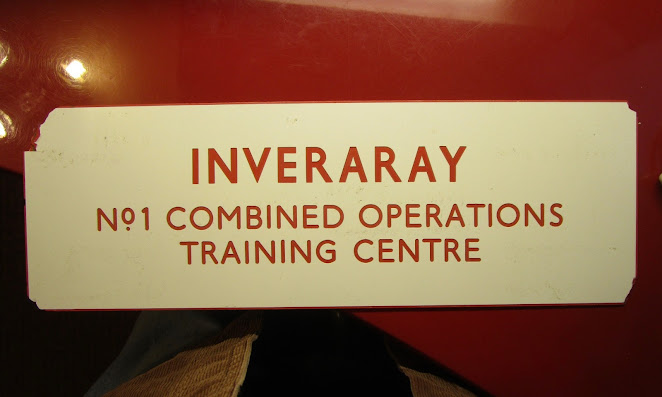

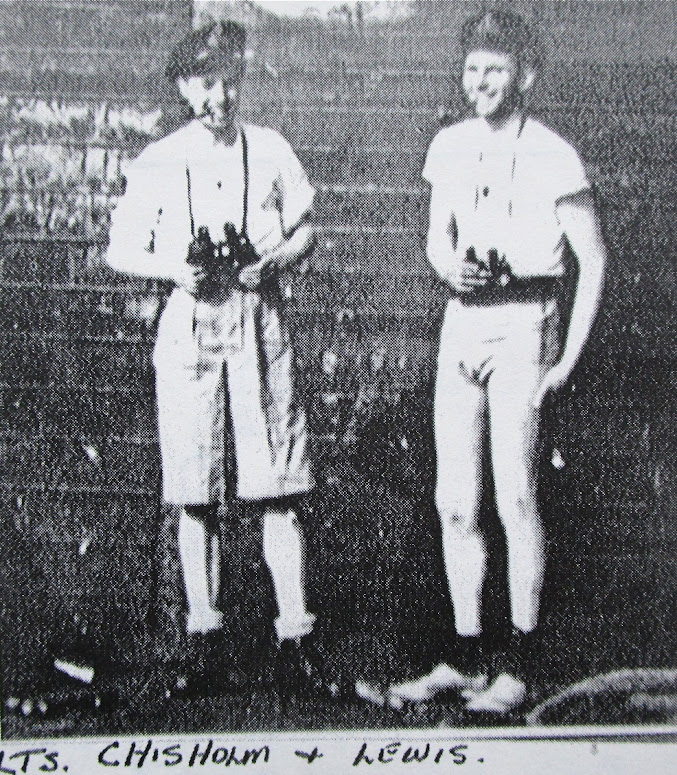
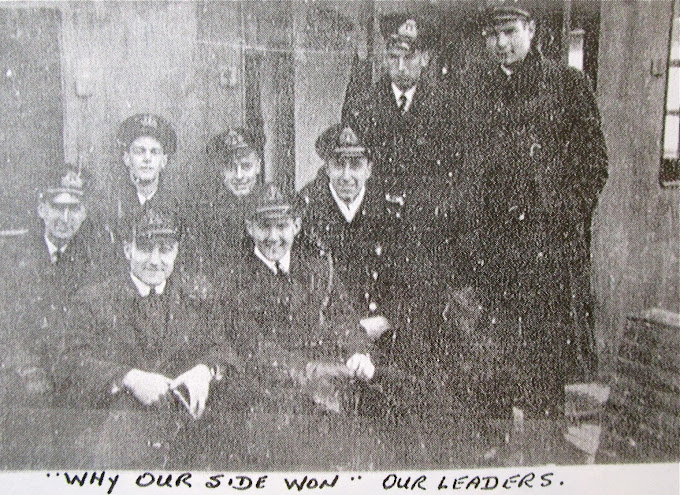

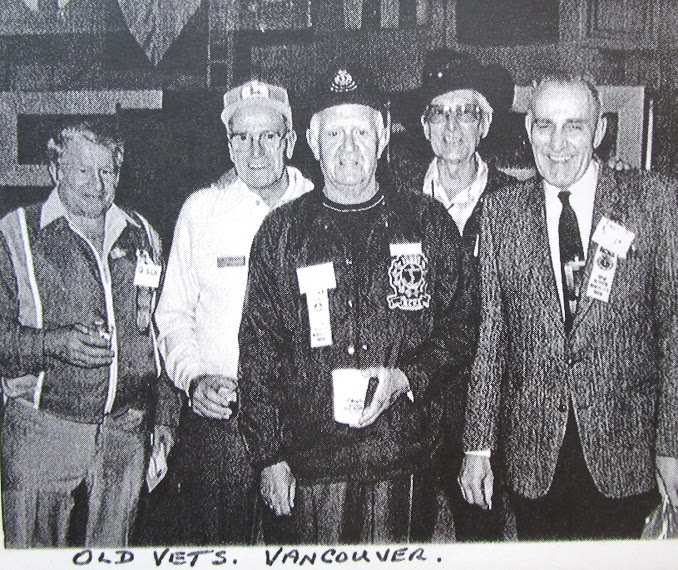
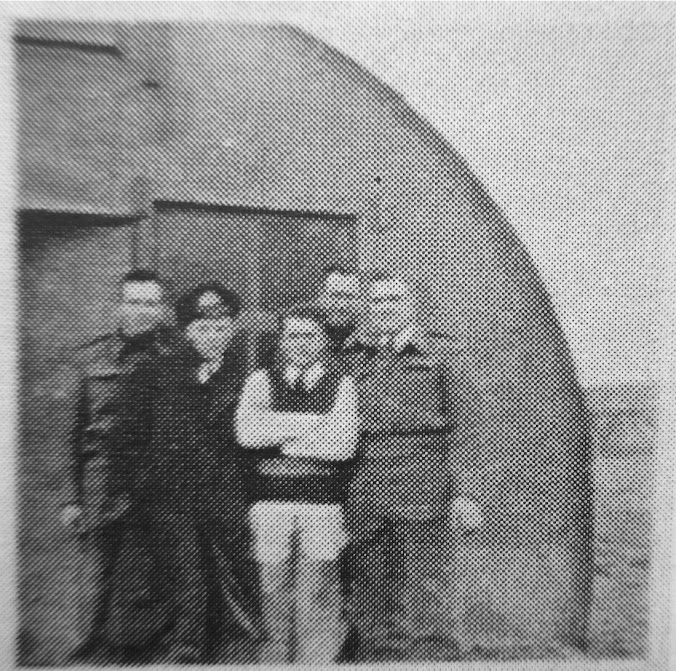
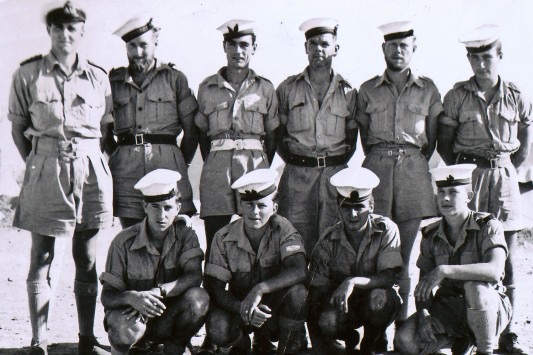


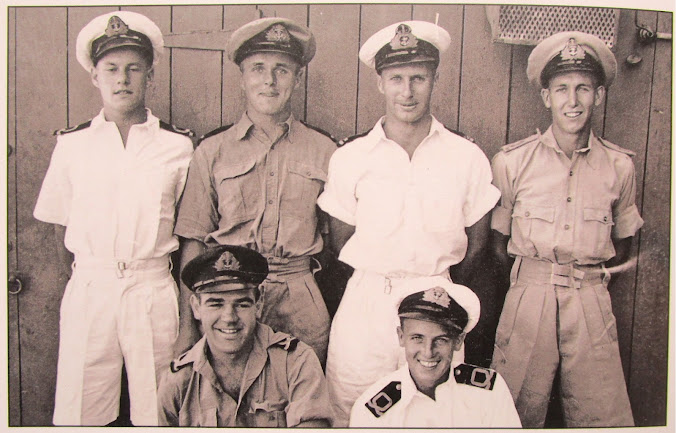

No comments:
Post a Comment